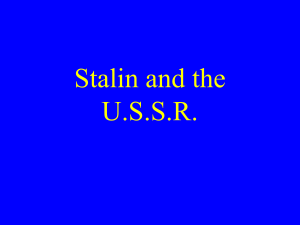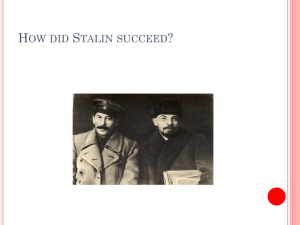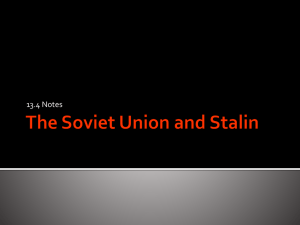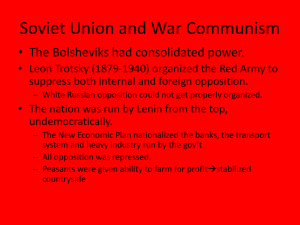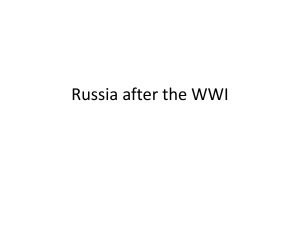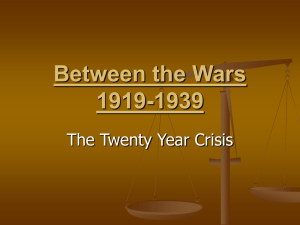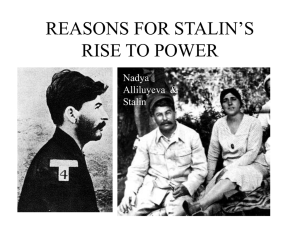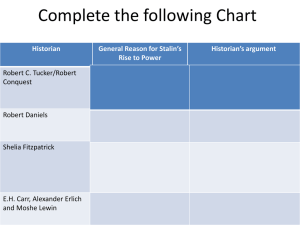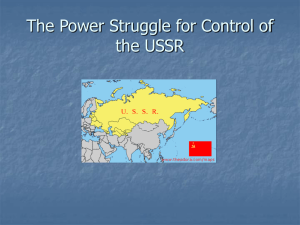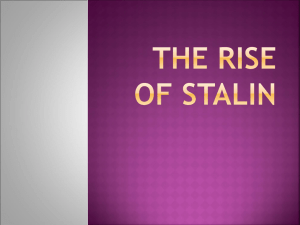Exam focus: Edexcel: Trotsky in power
advertisement
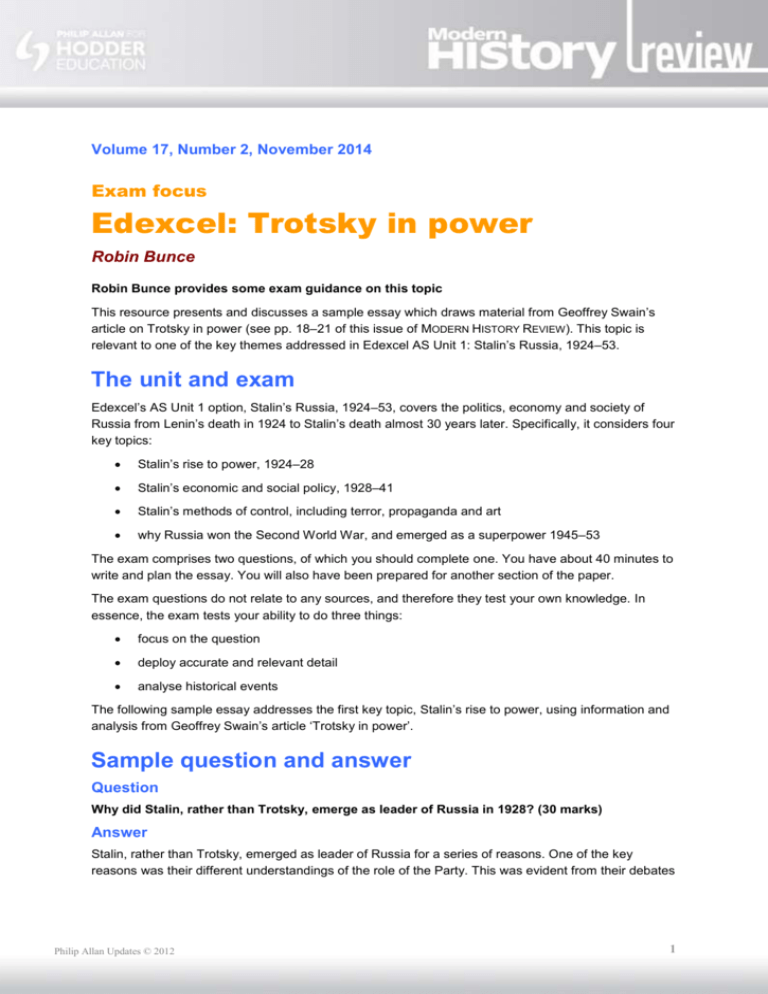
Volume 17, Number 2, November 2014 Exam focus Edexcel: Trotsky in power Robin Bunce Robin Bunce provides some exam guidance on this topic This resource presents and discusses a sample essay which draws material from Geoffrey Swain’s article on Trotsky in power (see pp. 18–21 of this issue of MODERN HISTORY REVIEW). This topic is relevant to one of the key themes addressed in Edexcel AS Unit 1: Stalin’s Russia, 1924–53. The unit and exam Edexcel’s AS Unit 1 option, Stalin’s Russia, 1924–53, covers the politics, economy and society of Russia from Lenin’s death in 1924 to Stalin’s death almost 30 years later. Specifically, it considers four key topics: Stalin’s rise to power, 1924–28 Stalin’s economic and social policy, 1928–41 Stalin’s methods of control, including terror, propaganda and art why Russia won the Second World War, and emerged as a superpower 1945–53 The exam comprises two questions, of which you should complete one. You have about 40 minutes to write and plan the essay. You will also have been prepared for another section of the paper. The exam questions do not relate to any sources, and therefore they test your own knowledge. In essence, the exam tests your ability to do three things: focus on the question deploy accurate and relevant detail analyse historical events The following sample essay addresses the first key topic, Stalin’s rise to power, using information and analysis from Geoffrey Swain’s article ‘Trotsky in power’. Sample question and answer Question Why did Stalin, rather than Trotsky, emerge as leader of Russia in 1928? (30 marks) Answer Stalin, rather than Trotsky, emerged as leader of Russia for a series of reasons. One of the key reasons was their different understandings of the role of the Party. This was evident from their debates Philip Allan Updates © 2012 1 over the economy and Stalin’s manipulation of the Party Congress. Tactics also played an important role as did concerns over the future of the Communist Revolution. The most important reason why Stalin, rather than Trotsky, emerged as leader of Russia was their different views over the Party. In terms of economic policy they disagreed over the relationship between the Party and economic experts. As early as the Eleventh Party Congress, of 1922, Trotsky advocated delegating economic planning to economic experts. Zinoviev rejected this view, arguing that it undercut the leading role of the Party by giving too much power to economic experts. At the Twelfth Party Congress of 1923, Trotsky argued that the relationship between the Party and economic experts should be the same as the relationship between the Military Revolutionary Council and the military leadership during the Civil War. In essence, Trotsky advocated the Party setting the strategy and direction for the economy, while economic experts worked on the implementation. Trotsky’s ideas were defeated and his authority within the party was diminished, in part because other senior Communists, led by Zinoviev, argued that they were not truly Leninist. Specifically, Zinoviev argued that Trotsky’s ideas did not recognise the leading role of the Communist Party. Stalin emerged as leader in part due to his ability to manipulate the Party and the Party Congress. Stalin recognised that Party members wanted to increase their power and privilege, and he used this in order to win support. Stalin’s roles as general secretary, as head of the Rabkrin and as head of the Central Control Commission allowed him to appoint Communists to senior positions, to sack or demote them and, increasingly throughout the 1920s, to influence which Communists attended the Party Congress. By 1923 left-wing Communists complained that a third of delegates at the Twelfth Party Congress had effectively been appointed by Stalin. While Stalin’s patronage helped him emerge as leader through the influence it gave him at Party Congress, Trotsky’s economic ideas were unattractive to Party members because they threatened to diminish their economic power. Therefore, Trotsky’s ideas undercut his appeal as leader. Stalin’s tactics were also an important reason why he, rather than Trotsky, emerged as leader. First, Stalin allowed other leading Communists to fight Trotsky. For example, from 1922 to 1924, Zinoviev was Trotsky’s most public opponent. Zinoviev attacked Trotsky for his ‘petty bourgeois deviation from Leninism’. Trotsky responded with his pamphlet Lessons of October which reminded the Party of Zinoviev’s cowardice in 1917. Stalin attacked Trotsky more subtly behind the scenes. For example, he cut the funding from Trotsky’s Dnieper Hydro-Electric Dam project in April 1926. Later in the 1920s, Stalin did the same thing: he allowed Bukharin to publicly criticise Trotsky, Zinoviev and Kamenev, while he stayed in the background. This helped Stalin emerge as leader because the public disputes damaged the reputations of Trotsky and all of those who were involved, while Stalin gained a reputation for being less confrontational and more responsible by staying out of the fights. Finally, Stalin, rather than Trotsky, emerged as leader of Russia because of concerns about the future of the revolution. Senior Communists were aware of the example of the French Revolution. Significantly, following the revolution, the new French state was taken over by Napoleon Bonaparte, the intellectually brilliant leader of France’s revolutionary army. Trotsky had much in common with Napoleon. He too was an intellectual and the leader of the revolutionary Red Army. Trotsky’s enemies accused him of Bonapartism: of wanting to use the Red Army to take power. These fears were reflected in 1925 when Trotsky was sacked as leader of the Red Army. Stalin, by contrast, was considered a much less dictatorial figure. He was a gifted administrator, not a dangerous military leader. Indeed, this perception of Stalin was reflected in two of his nicknames, ‘The Grey Blur’ and ‘Comrade Card Index’, which indicate that he was considered boring, but a good administrator. In this Philip Allan Updates © 2012 2 sense, Stalin, rather than Trotsky, emerged as leader of Russia partly because he was trusted, whereas Trotsky was widely considered to be dangerous. In conclusion, Stalin emerged as leader of Russia rather than Trotsky because he understood the Communist Party better than Trotsky. The struggle for power was a struggle for influence within the Communist Party. Stalin understood this and supported economic policies which heightened the power of Party members. At the same time, he used his power of patronage to ensure that Party Congresses were full of his supporters who voted in his favour. He also understood the tactics that best suited the struggle for influence within the Party. He allowed his opponents to fight each other, staying out of the fight as Trotsky, Zinoviev, Kamenev and Bukharin destroyed each other’s credibility. Finally, Stalin appealed to the Party because he was a competent administrator while Trotsky appeared to be a dangerous military leader who wanted to be a dictator. In the final analysis it was Stalin’s ability to understand and manipulate the Party that allowed him to win. Examiner’s commentary This essay is awarded 30/30 — high level 5. The essay scores highly for these reasons: It is focused on the question throughout. It contains a high level of detail. It covers a wide range of factors. It contains sustained analysis: it develops an argument that runs through the whole essay. The conclusion pulls the argument together and reaches a clear and well-supported judgement. Activity This essay is based on a plan. Reread the essay and try and work out the plan from the essay. First, count the paragraphs. Second, draw a spider diagram with a leg for each of the paragraphs. Alternatively, use bullet points if you prefer. Third, read each paragraph and then note down the main point of the paragraph on your spider diagram or bullet-pointed list. Fourth, this is a good essay, but it doesn’t cover every cause of Stalin’s rise to power. Add two legs to your spider diagram and note down two additional factors that explain Stalin’s rise to power. This resource is part of MODERN HISTORY REVIEW , a magazine written for A-level students by subject experts. To subscribe to the full magazine go to: http://www.hoddereducation.co.uk/historyreview Philip Allan Updates © 2012 3
